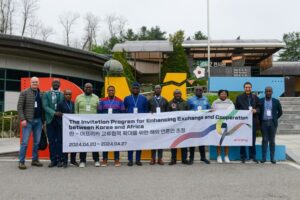By William Selassy ADJADOGO
A pivotal moment has arisen as Africa’s economic trajectory continues its upward ascent, presenting an unprecedented opportunity for collaboration between the continent and a key partner – the Republic of South Korea.
The upcoming Korea-Africa Summit represents a critical juncture, poised to unlock new horizons of shared prosperity, sustainability, and solidarity.
It marks a significant step in Korea’s comprehensive strategy to engage more deeply with the Global South, reflecting a commitment to global inclusiveness and cooperation.
The two-day event is scheduled to commence on June 4 and under the theme: The future we make together, shared growth sustainability and solidarity.
Participants are expected from Africa countries and related international organizations, key players in the Korean economy, academia, international business community, and civil society groups among others
In an interaction with a group of Africa journalists invited by Arirang TV, a Korean media giant, Mr. Chung Byung –Won, Deputy Minister of Political Affairs noted that the Korea-Africa Summit signals a clarion call for genuine partnership, mutual respect, and shared ownership of the future we aspire to create.
It is a future where the horizons of opportunity are boundless, where the dreams of nations are intertwined, and where the rising tide of Africa’s renaissance meets the soaring ambitions of South Korea’s global vision. Together, we can forge a path towards a world that is prosperous, sustainable, and united in purpose – a world where the future is truly made together.

For far too long, the narrative surrounding Africa has been one of untapped potential and unfulfilled promise. However, this outdated perspective fails to recognize the continent’s remarkable economic renaissance over recent decades.
With a combined GDP of US$2.7 trillion and an average growth rate surpassing the global average, Africa stands as an emerging force in the global economy.
Its trajectory is further bolstered by the landmark African Continental Free Trade Area (AfCFTA), creating a single market encompassing 1.3 billion consumers and facilitating the free movement of goods and services across national boundaries.
Within this context of immense economic promise, South Korea’s deepening engagement with Africa takes on profound significance. As a nation that has traversed an extraordinary path from aid recipient to economic powerhouse, South Korea possesses an unparalleled understanding of the challenges and aspirations that African nations face. Its transition from the ashes of war to a hub of innovation offers a blueprint for Africa’s developmental ambitions, embodying the transformative power of resilience, determination, and international collaboration.
Moreover, South Korea boasts a diverse array of technologies, ranging from traditional industries to cutting-edge innovations. This technological prowess positions South Korea to offer tailored solutions to address the varied needs of African countries. From traditional industries to frontier innovations, South Korea’s prowess positions it as an ideal partner to catalyse Africa’s growth trajectories across various sectors, including sustainable energy, infrastructure, and digital transformation.
Leveraging South Korea’s expertise in education and vocational training, alongside Africa’s abundant youth population, presents a significant opportunity for the continent’s capacity-building and skill development initiatives, empowering its youth and driving economic growth.
Crucially, South Korea’s educational excellence, coupled with Africa’s burgeoning youth population, presents a potent opportunity for capacity-building and skill development, empowering a generation poised to propel the continent’s economic fortunes.
Initiatives such as the KOICA-LG Technical and Vocational Education and Training (TVET) College in Ethiopia and the Global Korea Scholarship program underscore South Korea’s commitment to nurturing Africa’s human capital, fostering self-reliance, and unlocking the boundless potential of its people.
However, the essence of this partnership extends far beyond mere economic gain. South Korea’s holistic vision aligns seamlessly with Africa’s aspirations, encapsulated in the African Union’s “Agenda 2063” blueprint for sustainable and inclusive development. By fostering collaboration in areas such as climate resilience, food security, and digital transformation, South Korea and Africa can forge a path towards a future that is not only prosperous but also environmentally secure and socially equitable.
South Korea’s commitment to doubling its Official Development Assistance (ODA) to Africa by 2030 underscores its dedication to fostering self-reliance and homegrown solutions tailored to the unique contexts of individual nations. Initiatives like the Knowledge Sharing Program (KSP) and the K-Rice Belt project exemplify this philosophy, empowering African nations to chart their own developmental trajectories while benefiting from South Korea’s expertise and support.
Moreover, the Summit’s emphasis on peace and security acknowledges the inextricable link between stability and economic prosperity. South Korea’s steadfast support for African leadership in conflict resolution, coupled with its contributions to peacekeeping operations and the strengthening of regional organizations like the African Union, demonstrates its resolve to address the complex security challenges facing the continent.
By fostering dialogue, facilitating consensus, and amplifying African voices on the global stage, South Korea is positioning itself as a trusted partner and bridge-builder in the pursuit of lasting peace and stability.
As the world grapples with a polycrisis of unprecedented magnitude – from climate change and food insecurity to global supply chain disruptions and public health emergencies – the Korea-Africa Summit emerges as a beacon of hope, a testament to the power of collaboration in surmounting shared obstacles.
Whether navigating the intricate web of global supply chains, combating the existential threat of climate change, or fortifying public health resilience, the collective wisdom and resources of South Korea and Africa hold the key to overcoming adversity and shaping a more sustainable, equitable future for all.
Yet, the true impact of this partnership extends far beyond the confines of economic metrics or development indicators. It represents a profound shift in the global narrative, challenging long-held perceptions and redefining the contours of international cooperation.
By recognizing Africa as an equal partner, brimming with immense potential and ingenuity, South Korea is setting a precedent for a more inclusive and equitable global order – one that celebrates diversity while harnessing the collective strengths of nations.










